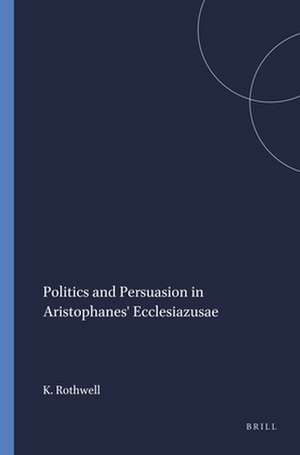Politics and Persuasion in Aristophanes' <i>Ecclesiazusae</i>: Mnemosyne, Supplements, cartea 111
Autor K.S. Rothwellen Limba Engleză Paperback – 30 apr 1990
Din seria Mnemosyne, Supplements
-
 Preț: 370.60 lei
Preț: 370.60 lei - 18%
 Preț: 1470.11 lei
Preț: 1470.11 lei - 18%
 Preț: 1598.51 lei
Preț: 1598.51 lei - 18%
 Preț: 735.03 lei
Preț: 735.03 lei - 18%
 Preț: 701.25 lei
Preț: 701.25 lei -
 Preț: 268.14 lei
Preț: 268.14 lei -
 Preț: 90.66 lei
Preț: 90.66 lei - 18%
 Preț: 584.02 lei
Preț: 584.02 lei -
 Preț: 169.79 lei
Preț: 169.79 lei -
 Preț: 216.33 lei
Preț: 216.33 lei - 18%
 Preț: 585.26 lei
Preț: 585.26 lei - 18%
 Preț: 729.55 lei
Preț: 729.55 lei - 18%
 Preț: 657.49 lei
Preț: 657.49 lei - 15%
 Preț: 412.41 lei
Preț: 412.41 lei - 18%
 Preț: 708.10 lei
Preț: 708.10 lei - 18%
 Preț: 731.10 lei
Preț: 731.10 lei -
 Preț: 270.76 lei
Preț: 270.76 lei - 18%
 Preț: 730.73 lei
Preț: 730.73 lei - 18%
 Preț: 733.06 lei
Preț: 733.06 lei - 18%
 Preț: 586.34 lei
Preț: 586.34 lei - 18%
 Preț: 731.88 lei
Preț: 731.88 lei - 18%
 Preț: 586.18 lei
Preț: 586.18 lei - 18%
 Preț: 1544.99 lei
Preț: 1544.99 lei - 18%
 Preț: 731.65 lei
Preț: 731.65 lei - 18%
 Preț: 732.03 lei
Preț: 732.03 lei - 18%
 Preț: 972.54 lei
Preț: 972.54 lei - 18%
 Preț: 585.95 lei
Preț: 585.95 lei -
 Preț: 380.61 lei
Preț: 380.61 lei - 18%
 Preț: 718.31 lei
Preț: 718.31 lei - 18%
 Preț: 732.21 lei
Preț: 732.21 lei - 18%
 Preț: 586.26 lei
Preț: 586.26 lei - 18%
 Preț: 731.59 lei
Preț: 731.59 lei - 18%
 Preț: 1257.68 lei
Preț: 1257.68 lei - 18%
 Preț: 970.27 lei
Preț: 970.27 lei - 18%
 Preț: 557.30 lei
Preț: 557.30 lei - 18%
 Preț: 847.32 lei
Preț: 847.32 lei - 18%
 Preț: 732.44 lei
Preț: 732.44 lei - 18%
 Preț: 731.80 lei
Preț: 731.80 lei -
 Preț: 355.16 lei
Preț: 355.16 lei - 18%
 Preț: 588.14 lei
Preț: 588.14 lei - 18%
 Preț: 1211.56 lei
Preț: 1211.56 lei - 18%
 Preț: 586.11 lei
Preț: 586.11 lei - 18%
 Preț: 732.83 lei
Preț: 732.83 lei - 18%
 Preț: 732.35 lei
Preț: 732.35 lei - 18%
 Preț: 1484.13 lei
Preț: 1484.13 lei - 18%
 Preț: 731.59 lei
Preț: 731.59 lei - 18%
 Preț: 730.63 lei
Preț: 730.63 lei - 18%
 Preț: 732.03 lei
Preț: 732.03 lei - 18%
 Preț: 970.21 lei
Preț: 970.21 lei
Preț: 581.91 lei
Preț vechi: 709.64 lei
-18% Nou
Puncte Express: 873
Preț estimativ în valută:
111.34€ • 116.88$ • 92.42£
111.34€ • 116.88$ • 92.42£
Carte indisponibilă temporar
Doresc să fiu notificat când acest titlu va fi disponibil:
Se trimite...
Preluare comenzi: 021 569.72.76
Specificații
ISBN-13: 9789004091856
ISBN-10: 9004091858
Pagini: 118
Dimensiuni: 155 x 235 x 9 mm
Greutate: 0.24 kg
Editura: Brill
Colecția Brill
Seria Mnemosyne, Supplements
ISBN-10: 9004091858
Pagini: 118
Dimensiuni: 155 x 235 x 9 mm
Greutate: 0.24 kg
Editura: Brill
Colecția Brill
Seria Mnemosyne, Supplements
Public țintă
Classics scholars interested in rhetoric and persuasion, the role of women in comedy and Greek culture, and the ideals of the restored democracy, and general concerns of plot, character and satire in Aristophanes.Recenzii
'This study is to be warmly welcomed, and one may hope that it will provoke further interpretative work on aspects of the play...'
Alan H. Sommerstein, the Classical Review, 1991.
'...a most readable and thoght-provoking book...has succeeded in making explicit one of the major sources of humour in the play....A welcome contribution to the study of the Ecclesiazusae...'
Ineke Sluiter, Mnemosyne, 1992.
Alan H. Sommerstein, the Classical Review, 1991.
'...a most readable and thoght-provoking book...has succeeded in making explicit one of the major sources of humour in the play....A welcome contribution to the study of the Ecclesiazusae...'
Ineke Sluiter, Mnemosyne, 1992.
Notă biografică
Kenneth Rothwell, Ph.D. Columbia University (1985), is Associate Professor in the Department of Classics, Holy Cross College, Worcester, MA. He has received the Lawler Scholarship and the President's fellowship and the University fellowship from Columbia. This volume is his first major publication.
